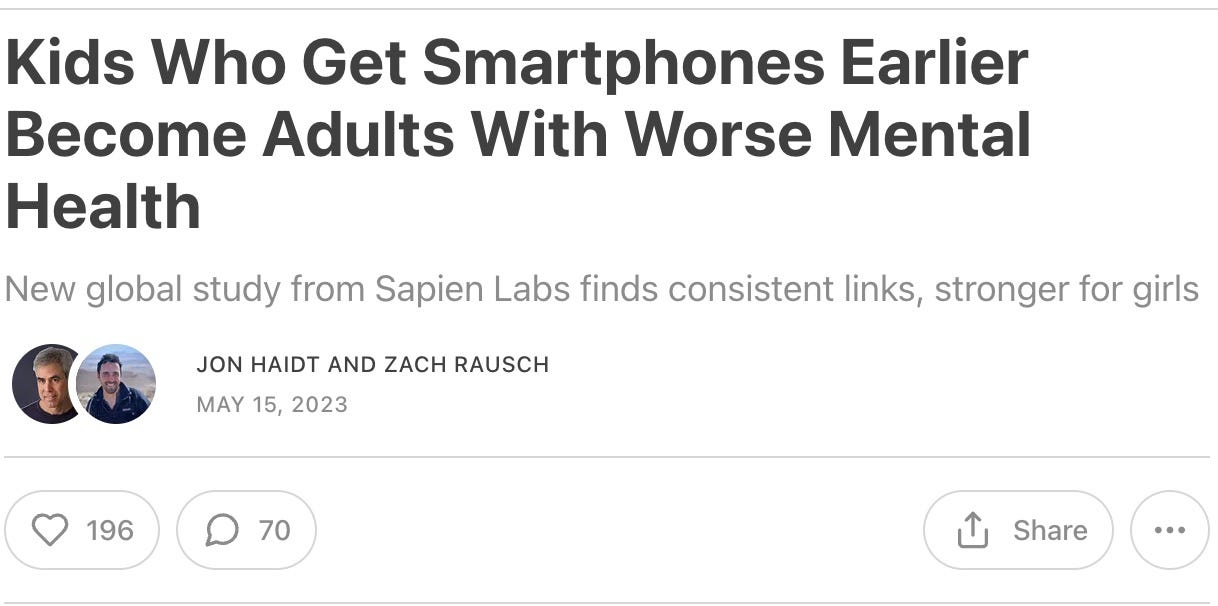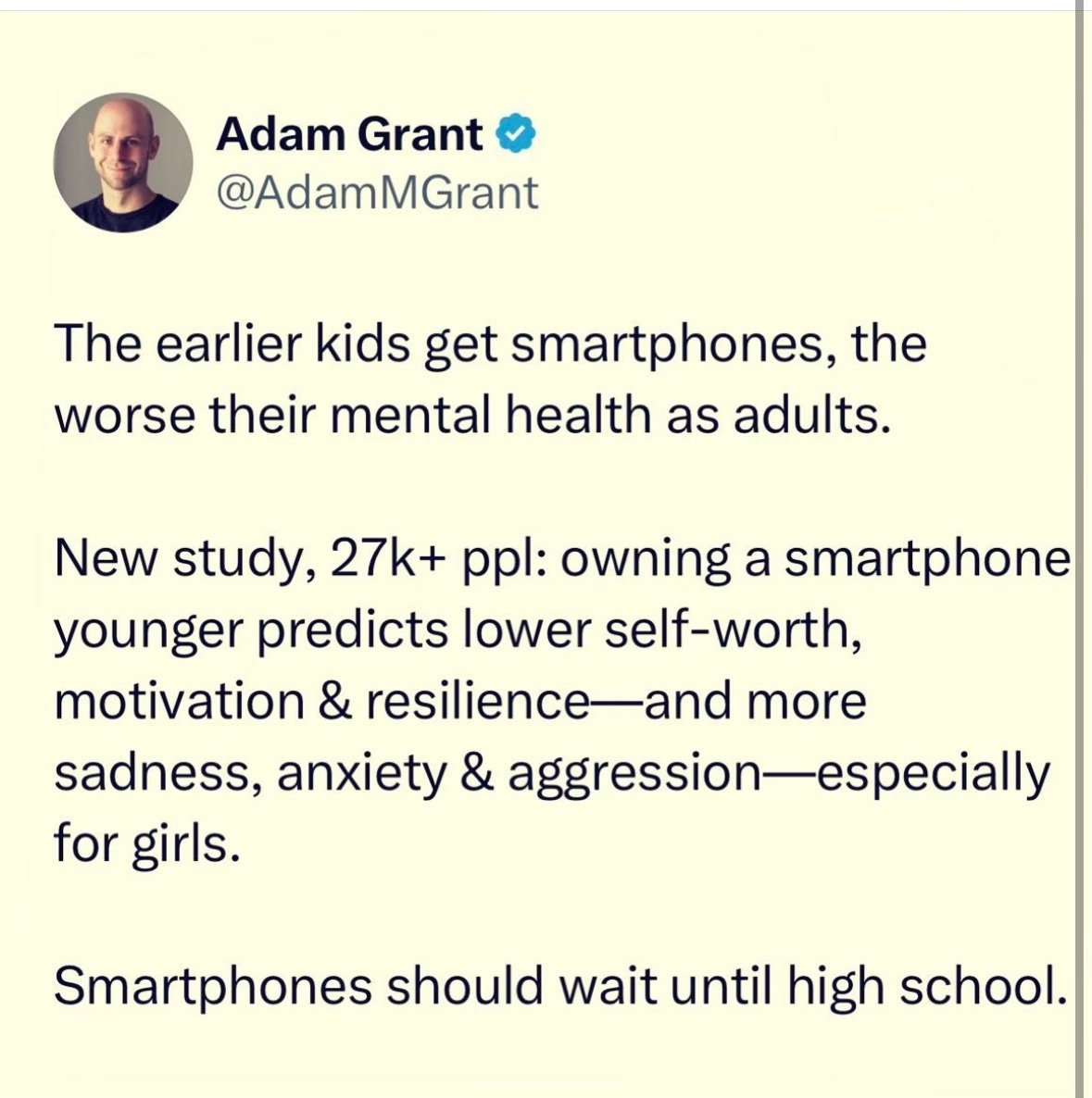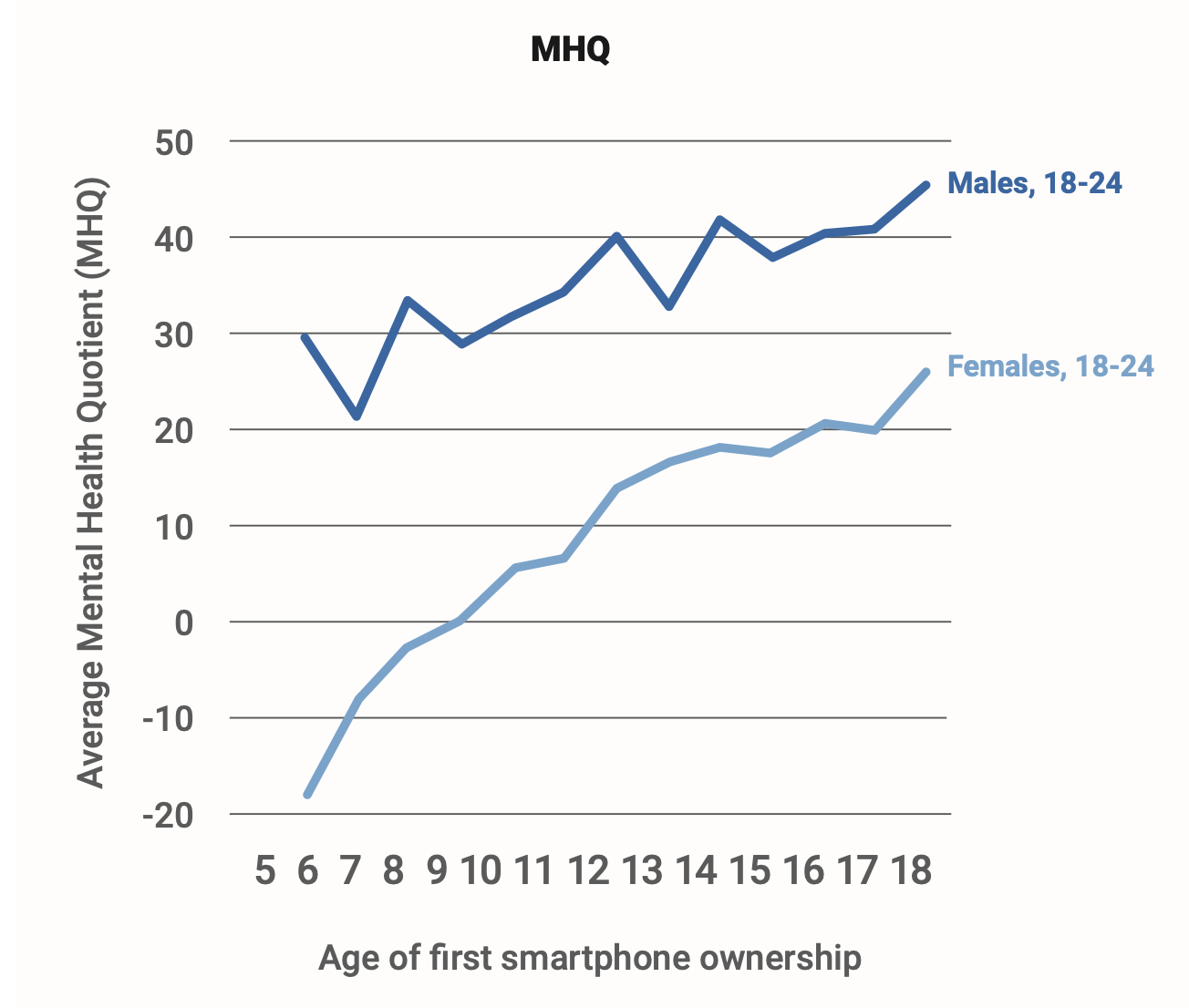Welcome to Techno Sapiens! Subscribe to get research-backed tips for living and parenting in the digital age.
5 min read
A new study is making the rounds across the Substack-sphere, as well as the Adam-Grant’s-Instagram-page-sphere,1 and, as it turns out, those two online spaces seem to cover just about everyone I know.


So, I got a lot of emails and DMs about this study—asking what I thought, whether I’d seen it, and in one case (my younger sister), whether I was planning to publicly debate the findings with other academics in some kind of gladiator-style2 battle of the nerds. Aren’t families the best? (10 years I was in school for this! 10 years!)
Alas, we’ll save the nerd Coliseum for another day, but I do want to talk about this study, and what it can, and can’t, tell us.
The study is called Age of First Smartphone/Tablet and Mental Wellbeing Outcomes and was released a few days ago by a non-profit called Sapien Labs (no connection to Techno Sapiens apart from, it seems, an appreciation for Latin). The study looks at associations between the age that individuals reported getting their first smartphone or tablet, and their mental health as young adults.
It’s an impressive study, and a useful addition to our knowledge on this topic. And, like all studies, it has its limitations.
Let’s start with the punchline
Might it be a good idea to wait on smartphones until high school? Absolutely. Should we consider holding off on social media until kids are 14 or 15, or maybe even 16? Sure! These things make a lot of sense to me.
But does this study prove that we should do this? No.
What did the researchers do?
This is how the study worked:
The researchers collected data from 27,969 young adults (ages 18 to 24) from 41 countries across the world.
These participants were recruited via Facebook and Google ads, and answered questions via an online self-report survey.
They answered the following question: At what age did you get your own smartphone or tablet (e.g. iPad) with Internet access that you could carry with you?3
They also answered a 15-minute questionnaire about their mental health, called the MHQ. This assesses aspects of mental health like social functioning, cognition, adaptability, and mood. (Anyone can take it for free here!). Scores on the MHQ range from -100 to 200, and higher scores mean better wellbeing.
Researchers then analyzed the data to examine the average MHQ score of respondents who got a smartphone/tablet at each age. See, for example, this nice chart:
As you can see, participants who reported getting their first smartphone/tablet earlier also reported lower average mental health scores, especially girls.
Good stuff about the study
The scale of this study is incredibly impressive. Almost 30,000 participants! 41 countries! Not to mention, they collected this data between January 1st and April 30th 2023, and already analyzed it and wrote up the report. I’m tired just thinking about it. This type of rapid turnaround time is valuable, particularly in a subject area like this one where things are evolving fast and we’re in desperate need of more information.
Other strengths of the study include the comprehensive, multi-domain measure of mental health, and the high level of transparency. All the questionnaires, protocols, and actual data are freely available online, which is important for reproducibility.4
Hats off to Sapien Labs, truly. I hope your research team can have a nice nap now.
Limitations of the study
This was a one-time, online survey. It was very large and comprehensive, but this does not change the fact that the findings are correlational.
And what do we know about correlational studies? [Techno sapiens stand up, pump their firsts, and chant in unison] Correlation does not equal causation!
Here is precisely what the results of the study tell us: People who said they got their first smartphone or tablet at earlier ages, compared to people who said they got them at later ages, also reported worse mental health as young adults.
One explanation, of course, is that getting the smartphone or tablet at, say, age 10 instead of age 16 caused the worse mental health as young adults.
Another explanation is that having worse mental health caused participants to report earlier ages of first smartphone/tablet access. This seems unlikely.
Another more plausible explanation, though, is that some other variables—family situation, environmental factors—caused both the earlier age of smartphone/tablet access and the worse mental health as young adults.
From this study, we cannot say which of these explanations is correct. To do that, we need more experimental work, e.g., studies that randomly assign kids to get smartphones at different ages, and then follow them over time to measure changes in their well-being.5
Can someone just tell us what to do already?
Decisions about when to allow smartphones or social media for our kids feel high-stakes. We really want a study to just tell us, once and for all, what we should do. We want clear evidence, no caveats, a definitive conclusion that X causes Y, and the right age for a smartphone is exactly 14.25 years old.6 As a person who consults the academic literature on all manner of parenting questions with somewhat alarming frequency, I get it. I really do.
This study doesn’t give us that. It gives us useful information to add to the overall body of knowledge on the topic of kids and smartphones, but it doesn’t prove anything. And it certainly doesn’t give us an answer on the “right age” for a smartphone.
It absolutely might make sense to hold off on getting our kids smartphones. Or, if we do get them smartphones earlier on, it’s probably smart to wait on social media (see this post). Here’s the thing: we can come to that conclusion without some smoking gun study to prove once and for all that smartphones cause mental health issues.
Over time, I hope we’ll accumulate high-quality, causal evidence to point us further in one direction or another. For now, as both parents and researchers, let’s keep doing our best in a world where proof is hard to come by.
A quick survey
What did you think of this week’s Techno Sapiens? Your feedback helps me make this better. Thanks!
The Best | Great | Good | Meh | The Worst
In case you missed it
I only started following Adam Grant on Instagram this week, but now I wonder if I’ve been missing out? Adam Mosseri follows him! And Katie Couric! Dax Shepard! Half Baked Harvest! Also, there’s a video of him doing some kind of flip/twist off a diving board? What can’t this man do?
Oh, why yes, Spencer Treat Clark (the kid who played Lucius in the 2000 film Gladiator) did attend the same middle school as me. But, of course, at the time, we just knew him as…Spencer Treat Clark, that kid who was in Gladiator. Yes, yes, it can be exhausting dealing with that kind of proximal fame, but I guess we just adjusted to it over time, you know? We just had to live our lives.
The interesting thing about the wording of this question—which lumps together access to smartphones and tablets (e.g., iPads)—is that, taking the findings at face value, we’d have to conclude that kids should not be getting tablets at early ages, either. In fact, if we really take the findings literally, one could argue that no child should get a smartphone or tablet until age 18, since these are technically the adults reporting the highest levels of mental health. I have not heard anyone arguing for this.
You can request access to the full dataset used in this study here. I, of course, did this. Not only did the kind people at Sapien Labs grant access in less than 12 hours, they also sent a personalized email offering to walk me through it and answered a question I emailed them within minutes. Honestly, do these people never sleep? I’ll also note that the dataset was incredibly clean, nicely labeled, and easy to work with. Given my previous experiences with publicly-accessible datasets—most of which have involved banging my head against the keyboard in frustration before even running a single analysis—it was truly remarkable.
Quasi-experimental studies are also valuable here. For example, studies like this one or this one that take advantage of circumstances that naturally occurred in the world (e.g., the random timing that Facebook was introduced on different college campuses, or that high-speed Internet was introduced in different cities) to determine effects on well-being.
That’s 171 months for those of us who plan never to make the switch to counting our children’s ages in years (my son’s 22 months now).






It would be nice to see this data with the average time kids spend with their parents at home. I'm thinking that if parents work/travel a lot etc... and they are not often home when their kids are, kids need a phone earlier on so that parents can check on them, and they also have worse coping skills/mental health because they cannot talk much with their parents about their problems
The tablets-- that’s the spin I’ve been looking for too. No one is rallying against Kindle Fires in bright soft cases yet.